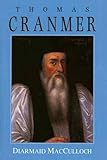Thomas Cranmer
by MacCulloch, Diarmaid.
Material type: BookPublisher: New Haven ; London : Yale University Press, c1996Description: xii, 692p. : ill., facsims., ports. ; 24 cm.ISBN: 9780300066883 (hbk.) :.Classification number: 920 CRASubject(s): Cranmer, Thomas, 1489-1556 | Church of England -- Biography | Bishops -- England -- Biography | Biography & non-fiction prose | Biography: historical, political & military | European history | Anglican & Episcopalian Churches | Biography | Great Britain -- History -- Tudors, 1485-1603Summary: Writing from a balanced position, Diarmaid MacCulloch draws on a lifetime's scholarship of the period to present a vivid picture of Thomas Cranmer, best-known today as the author of the Anglican liturgy in the Book of Common Prayer. Thomas Cranmer was the architect of the Anglican Book of Common Prayer. He was the Archbishop who guided England through the early Reformation, and Henry VIII through the minefields of divorce. Diarmaid MacCulloch traces Cranmer from his East-Midland roots to early Tudor Cambridge, into the household of the family of Anne Boleyn, and through the political labyrinth of the Henrican court. By then a major English statesman, living the life of a mediaeval prince-bishop, Cranmer navigated the church through the king's vacillations and finalized two successive English Prayer Books.;MacCulloch reconstructs the crises which Cranmer negotiated, from his compromising association with three of Henry's divorces, the plot by religious conservatives to oust him, his role in the attempt to establish Lady Jane Grey as Queen, to the vengeance of the Catholic Mary Tudor. In gaol after Mary's accession, Cranmer nearly succumbed to recant his life's achievements, but was able to turn the very day of his death at the stake into a dramatic demonstration of his Protestant faith.;From this account, Cranmer emerges as a sharply-focussed figure, more conservative early in his career than admirers have allowed, more evangelical than Anglicanism would later find comfortable. His legacy is his contribution to the shape and structure of English speech and, through his Prayer Book, to the moulding of an international language and the theology it expressed.
BookPublisher: New Haven ; London : Yale University Press, c1996Description: xii, 692p. : ill., facsims., ports. ; 24 cm.ISBN: 9780300066883 (hbk.) :.Classification number: 920 CRASubject(s): Cranmer, Thomas, 1489-1556 | Church of England -- Biography | Bishops -- England -- Biography | Biography & non-fiction prose | Biography: historical, political & military | European history | Anglican & Episcopalian Churches | Biography | Great Britain -- History -- Tudors, 1485-1603Summary: Writing from a balanced position, Diarmaid MacCulloch draws on a lifetime's scholarship of the period to present a vivid picture of Thomas Cranmer, best-known today as the author of the Anglican liturgy in the Book of Common Prayer. Thomas Cranmer was the architect of the Anglican Book of Common Prayer. He was the Archbishop who guided England through the early Reformation, and Henry VIII through the minefields of divorce. Diarmaid MacCulloch traces Cranmer from his East-Midland roots to early Tudor Cambridge, into the household of the family of Anne Boleyn, and through the political labyrinth of the Henrican court. By then a major English statesman, living the life of a mediaeval prince-bishop, Cranmer navigated the church through the king's vacillations and finalized two successive English Prayer Books.;MacCulloch reconstructs the crises which Cranmer negotiated, from his compromising association with three of Henry's divorces, the plot by religious conservatives to oust him, his role in the attempt to establish Lady Jane Grey as Queen, to the vengeance of the Catholic Mary Tudor. In gaol after Mary's accession, Cranmer nearly succumbed to recant his life's achievements, but was able to turn the very day of his death at the stake into a dramatic demonstration of his Protestant faith.;From this account, Cranmer emerges as a sharply-focussed figure, more conservative early in his career than admirers have allowed, more evangelical than Anglicanism would later find comfortable. His legacy is his contribution to the shape and structure of English speech and, through his Prayer Book, to the moulding of an international language and the theology it expressed.
| Item type | Current library | Collection | Call number | Status | Date due | Barcode | Item holds | |
|---|---|---|---|---|---|---|---|---|
| Book - Adult Hardback | Reserve Collection | Adult Non-Fiction | 920 CRA (Browse shelf(Opens below)) | Available | 001794275x |
Includes bibliographical references (p. 644-670) and index.
Writing from a balanced position, Diarmaid MacCulloch draws on a lifetime's scholarship of the period to present a vivid picture of Thomas Cranmer, best-known today as the author of the Anglican liturgy in the Book of Common Prayer. Thomas Cranmer was the architect of the Anglican Book of Common Prayer. He was the Archbishop who guided England through the early Reformation, and Henry VIII through the minefields of divorce. Diarmaid MacCulloch traces Cranmer from his East-Midland roots to early Tudor Cambridge, into the household of the family of Anne Boleyn, and through the political labyrinth of the Henrican court. By then a major English statesman, living the life of a mediaeval prince-bishop, Cranmer navigated the church through the king's vacillations and finalized two successive English Prayer Books.;MacCulloch reconstructs the crises which Cranmer negotiated, from his compromising association with three of Henry's divorces, the plot by religious conservatives to oust him, his role in the attempt to establish Lady Jane Grey as Queen, to the vengeance of the Catholic Mary Tudor. In gaol after Mary's accession, Cranmer nearly succumbed to recant his life's achievements, but was able to turn the very day of his death at the stake into a dramatic demonstration of his Protestant faith.;From this account, Cranmer emerges as a sharply-focussed figure, more conservative early in his career than admirers have allowed, more evangelical than Anglicanism would later find comfortable. His legacy is his contribution to the shape and structure of English speech and, through his Prayer Book, to the moulding of an international language and the theology it expressed.
There are no comments on this title.
